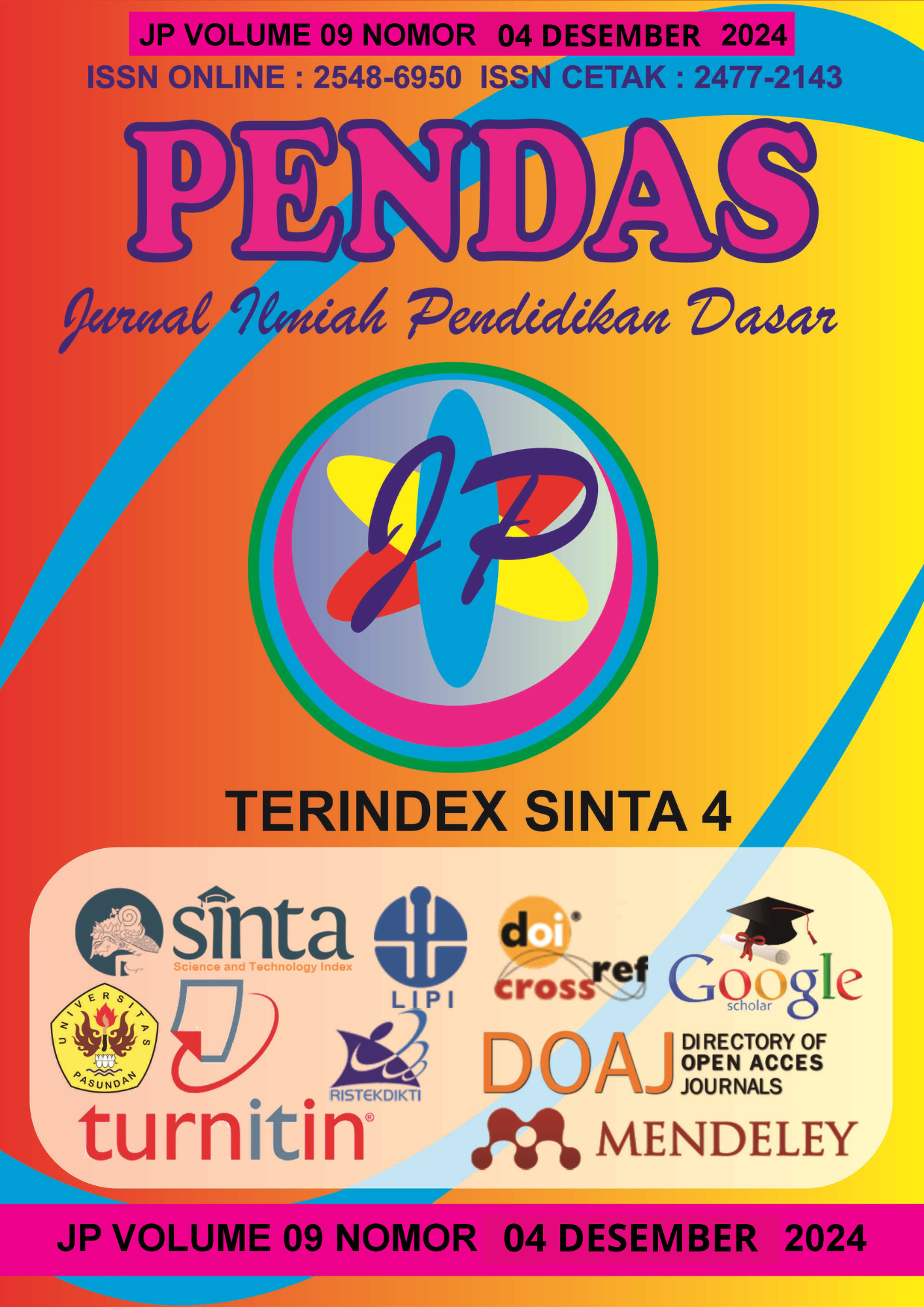HUBUNGAN ANTARA POLA ASUH PERMISIF DAN KONFORMITAS TEMAN SEBAYA DENGAN PERILAKU ALKOHOLIK PADA REMAJA DI DESA TIGAJURU KABUPATEN JEPARA
DOI:
https://doi.org/10.23969/jp.v9i04.20791Keywords:
Adolescents, Alcoholic Behavior, Permissive Parenting, Peer ConformityAbstract
The purpose of this study is to empirically determine the relationship between permissive parenting and peer conformity with alcoholic behavior in adolescents in Tigajuru village, Jepara Regency. This research is quantitative in nature. This research was conducted from July to December 2024. In this study, researchers took the population as adolescents in Tigajuru village, Jepara district aged 18-23 years who more than 2 years often consume liquor / alcohol. The sampling technique used in this study is non probability sampling with purposive sampling method. Data collection in this study used a permissive parenting scale consisting of 19 unfavorable items with a reliability of 0.963, a peer conformity scale consisting of 11 items divided into 2 favorable items and 9 unfavorable items with a reliability of 0.963, and an alcoholic behavior scale consisting of 11 items divided into 1 favorable item and 10 unfavorable items with a reliability of 0.963. Data analysis in this study used two predictor regression analysis methods and product moment. The results of this study show a p value of 0.506 (p.>0.05) so that the major hypothesis that says there is a significant relationship between permissive parenting and peer conformity with alcoholic behavior is rejected with an effective contribution of 0.34%. Thus, the conclusion of this study is that permissive parenting and peer conformity do not have a significant influence on alcoholic behavior in adolescents in Tigajuru village, Jepara Regency.
Downloads
References
Ajzen, I. (2002). Theory of planned behavior. In P. A. M. van Lange, A. W. Kruglanski, & E. T. Higgins (Eds.), Handbook of theories of social psychology (pp. 438–459). Sage Publications.
Altman, I., & Taylor, D. (2013). Social penetration: The development of interpersonal relationships. Holt, Rinehart and Winston.
American Psychiatric Association. (2013). Diagnostic and statistical manual of mental disorders (5th ed.). American Psychiatric Publishing.
Azwar, S. (2021). Reliabilitas dan validitas skala psikologi. Pustaka Pelajar.
Babey, S. H., Wolstein, J., & Diamant, A. L. (2019). Physical activity in adolescents: Improving health and reducing disparities. Journal of Adolescent Health, 64(4), 371–378.
Baumrind, D. (1991). The influence of parenting style on adolescent competence and substance use. Journal of Early Adolescence, 11(1), 56–95.
Brown, B. B., Bakken, J. P., Ameringer, S. W., & Mahon, S. D. (2014). A comprehensive conceptualization of the peer influence process in adolescence. New Directions for Child and Adolescent Development, 2014(123), 17–28.
Cipto, B., & Kuncoro, J. (2020). Hubungan antara konformitas kelompok dengan perilaku minum alkohol pada remaja. Jurnal Psikologi Sosial, 12(3), 123–134.
Clark, D. B., Doyle, S. R., & Clincy, A. (2013). Peer relationship factors and adolescent alcohol use behaviors. Alcohol Research & Health, 34(2), 154–162.
Dislitbang Polri. (2021). Data penggunaan alkohol remaja di Indonesia. Jakarta: Dislitbang Polri.
Dinkes Provinsi Jawa Tengah. (2021). Laporan tahunan kesehatan remaja Jawa Tengah 2021. Semarang: Dinas Kesehatan Jawa Tengah.
Fathi, I. (2011). Pengaruh pola asuh permisif terhadap perilaku remaja. Jurnal Psikologi Anak dan Remaja, 7(2), 145–159.
Fine, M. (2004). Parenting and adolescent development. Journal of Family Issues, 25(4), 473–506.
Frihastuti, R. (2012). Pola asuh orang tua terhadap konsumsi alkohol pada remaja. Jurnal Ilmu Sosial dan Humaniora, 9(3), 33–45.
Griffin, K. W., Botvin, G. J., Scheier, L. M., & Nichols, T. R. (2000). Parenting practices as predictors of substance use, delinquency, and aggression among urban minority youth: Moderating effects of family structure and gender. Psychology of Addictive Behaviors, 14(2), 174–184.
Habibi, A. (2015). Pengaruh pola asuh permisif terhadap perilaku remaja. Jurnal Pendidikan, 8(1), 12–22.
Hawari, D. (2006). Konseling psikologi keluarga. UI Press.
Javanmard, G., & Rogayeh, M. (2015). Peer conformity in adolescence and its implications for psychological well-being. Journal of Adolescent Psychology, 12(3), 87–97.
Kerr, M., & Stattin, H. (2000). Parenting styles and adolescent behavioral problems: Revisiting Baumrind’s typology. Developmental Psychology, 36(1), 74–88.
Kwureh, H. P. (2015). Peran teman sebaya terhadap perilaku alkoholik pada remaja. Jurnal Psikologi Remaja, 15(1), 87–99.
Lamborn, S. D., Mounts, N. S., Steinberg, L., & Dornbusch, S. M. (1991). Patterns of competence and adjustment among adolescents from authoritative, authoritarian, indulgent, and neglectful families. Child Development, 62(5), 1049–1065.
Miller, J. D., Lynam, D. R., & Leukefeld, C. (2018). Personality traits and peer influences as predictors of adolescent alcohol use. Addictive Behaviors, 24(3), 301–316.
Moore, G. F., & Colder, C. R. (2018). Parenting styles and adolescent alcohol use: The mediating role of peer influence. Alcoholism: Clinical and Experimental Research, 32(4), 673–683.
Norman, P., Boer, H., & Seydel, E. R. (2018). Theory of planned behavior: Predicting health behavior. In M. Conner & P. Norman (Eds.), Predicting health behaviour (pp. 73–122). Open University Press.
O'Sears, D. (2016). Pengaruh konformitas terhadap perilaku remaja. Jurnal Psikologi Sosial, 11(1), 44–51.
Prihatin, D. (2014). Pengaruh pola asuh orang tua terhadap perilaku minum alkohol pada remaja. Jurnal Ilmu Kesehatan, 5(2), 45–57.
Priyono, H. (2014). Metode penelitian kuantitatif. Gramedia Pustaka Utama.
Santrock, J. W. (2012). Adolescence (14th ed.). McGraw-Hill Education.
Scharp, K. M., Smith, A. C., & Potvin, A. L. (2018). Family relationships and adolescent psychological well-being. Family Relations, 67(4), 544–555.
Solina, D. (2018). Konsumsi alkohol pada remaja: Faktor internal dan eksternal. Jurnal Psikologi Klinis Remaja, 10(2), 133–145.
Sugiyono. (2013). Metode penelitian pendidikan. Alfabeta.
Twenge, J. M. (2018). Screen time and adolescent well-being: Evidence from a population-based study. Journal of Adolescent Research, 33(3), 213–231.
Udampo, Y., Yudas, Y., & Bani, B. (2017). Hubungan pola asuh permisif dengan perilaku konsumsi alkohol. Jurnal Psikologi, 15(1), 112–123.
Van der Vorst, H., Engels, R. C. M. E., Meeus, W., Deković, M., & van Leeuwe, J. (2006). The role of parental alcohol-specific rules in young adolescents’ drinking. Addiction, 101(4), 607–617.
WHO. (2018). Global status report on alcohol and health. World Health Organization.
Wijaya, F., & Rinaldi, A. (2018). Pengaruh pola asuh terhadap perilaku risiko pada remaja. Jurnal Psikologi Indonesia, 14(3), 173–185.
Downloads
Published
Issue
Section
License
Copyright (c) 2025 Pendas : Jurnal Ilmiah Pendidikan Dasar

This work is licensed under a Creative Commons Attribution 4.0 International License.














































